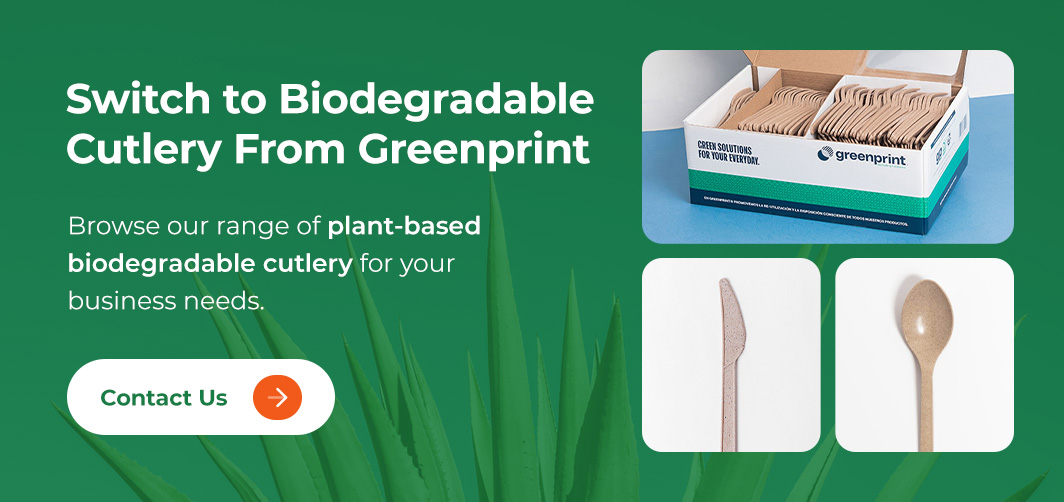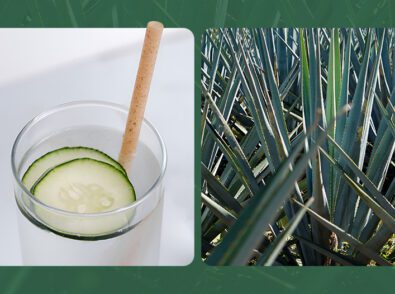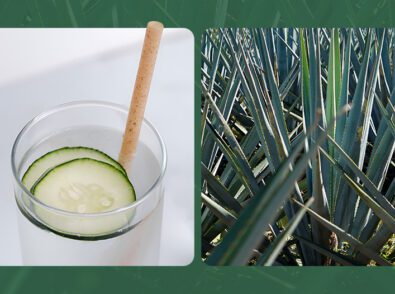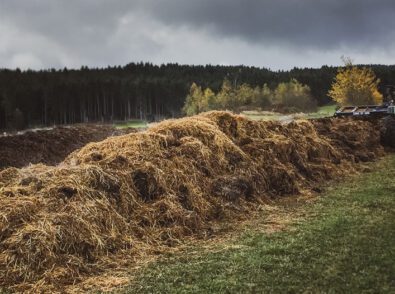Top Biodegradable Cutlery Manufacturers
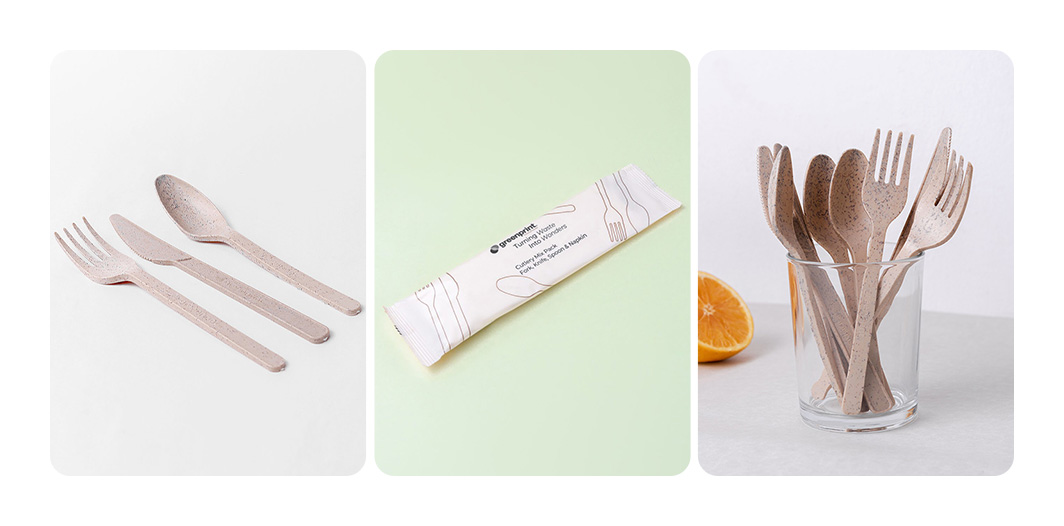
With rising consumer awareness around plastic pollution and sustainability, many business owners feel a strong responsibility to reduce their business’s environmental footprint. One way to do so is to explore eco-friendly cutlery options — traditional plastic products contribute significantly to waste in landfills and oceans.
Eco-products, including disposable cutlery, have a lesser environmental impact and contribute to a circular economy. If you’re a business owner looking for the best eco-friendly utensils for your operations, take a look at our list of top biodegradable cutlery manufacturers to help make an informed decision.
What Is Biodegradable Cutlery?
Biodegradable cutlery is made from materials that break down naturally in the environment. Unlike traditional plastic cutlery, which can take 200 years to decompose, biodegradable options often consist of plant-based materials, such as cornstarch, sugarcane, or bamboo.
When biodegradable cutlery is disposed of in the right conditions, such as composting environments, microorganisms break down the materials. These microbes consume the organic matter as a food source. Specific environmental conditions are necessary for decomposition to happen:
- Sufficient moisture levels help facilitate microbial activity.
- Higher temperatures speed up the breakdown process.
- Oxygen-rich conditions enhance the activity of bacteria that break down organic materials.
The time it takes for biodegradable cutlery to decompose varies based on the material and environmental conditions. Once the biodegradable cutlery has fully decomposed, it typically results in water, carbon dioxide, and organic matter that can be used to enrich soil. Many products require industrial composting facilities that provide optimal conditions for rapid decomposition.
What to Look for in Biodegradable Cutlery
How do you choose the best utensil manufacturer to ensure your choice aligns with your sustainability goals and meets the needs of your business? Here’s what you should look for:
- Product range: Find suppliers offering different types of eco-friendly cutlery. Ordering forks, knives, spoons, and plates from one company will streamline future order processes.
- Durability and usability: Assess whether the cutlery can handle various types of food, including hot, oily, and heavy items, without breaking or bending. Consider how the cutlery feels in your hand and how it will work in dining or catering settings.
- Sustainability credentials: Confirm the cutlery has certifications from reputable organizations, such as Biodegradable Products Institute (BPI), ASTM D6400, and USDA BioPreferred.
- Supplier reputation: Research the manufacturer’s overall commitment to sustainability, including their sourcing practices, production methods, and community engagement. Look for testimonials from other businesses regarding their product quality and service reliability.
- Environmental impact: Look for manufacturers that provide a life cycle assessment showing the environmental impact of their products from production to disposal.
Top Eco-Friendly Utensils Manufacturers
Suppliers are constantly innovating eco-friendly products to align with increasing regulations against single-use plastics that align with brand and customer values. Check out our list to find your personal top biodegradable cutlery manufacturer:
1. Greenprint Plant-Based Biodegradable Cutlery
Greenprint offers sustainable agave-based cutlery designed to enhance your business’s eco-friendliness. Committed to a circular economy, Greenprint emphasizes sustainability through efficient manufacturing processes, zero-plastic packaging, and community-building initiatives.
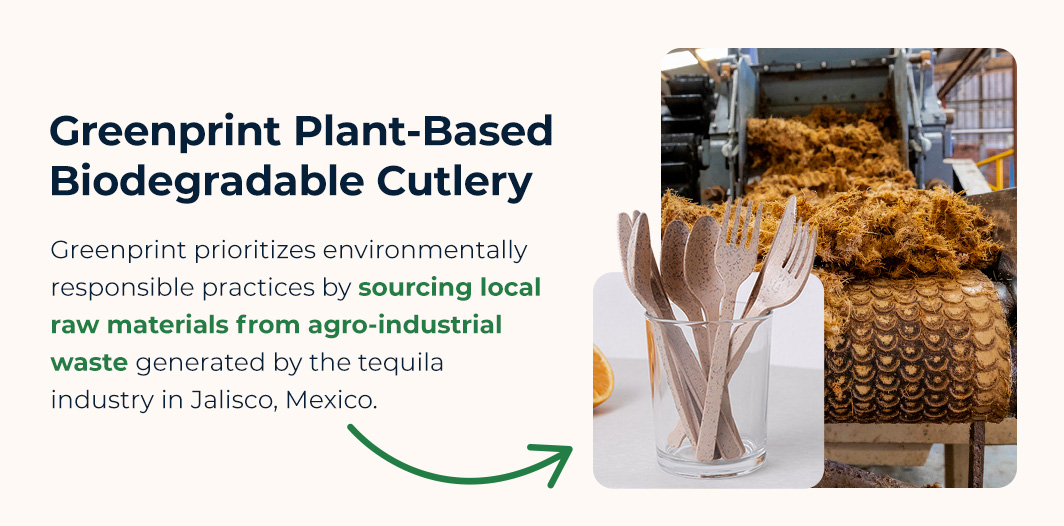
Greenprint prioritizes environmentally responsible practices by sourcing local raw materials from agro-industrial waste generated by the tequila industry in Jalisco, Mexico. The products are designed for easy disposal, whether through regular trash or recycling.
The agave cutlery is durable enough for various uses, including in-house dining, take-out orders and a variety of foods, and degrades in just one to three years. All fibers comply with ASTM 6400 and ASTM 5511 standards. Other benefits of Greenprint’s agave-based cutlery include:
- All knives, forks, and spoons are sold separately or in kits.
- The cutlery contains no Bisphenol A or polyfluoroalkyl substances (PFAS).
- The manufacturing process contributes to lower carbon emissions.
- The Forest Stewardship Council (FSC)-certified plant fibers are sourced from sustainably managed forests.
It’s also important to note a few considerations of agave-based products:
- While biodegradable, they’re designed for disposal in trash rather than composting systems.
- Depending on the region, agave-based cutlery may not be as widely available.
- These products are only available in natural and black colors.
2. EcoTensil Paper Utensils
EcoTensil designs innovative biodegradable disposable spoons made from sturdy, moisture-resistant paperboard. Its utensils use up to 85% less material than traditional plastic or wooden cutlery, making them an eco-friendly choice for clients in foodservice, packaging, and food sampling businesses.
These paper utensils are made from materials sourced from sustainably managed forests and are certified compostable and recyclable, helping reduce waste in landfills. Other advantages include:
- A silky-smooth texture that enhances the eating experience without altering food taste.
- An ultra-compact design that saves on storage space and shipping costs.
- The ability to be used for various foods, such as frozen treats, salads, and desserts.
That said, EcoTensil’s products have the following downsides:
- Although sturdy for many uses, paper utensils have durability limitations for heavy, thick, and greasy foods.
- Prolonged exposure to liquids may affect the utensils’ integrity.
3. Green Paper Products CPLA and Wood Cutlery
Certified by the BPI, Green Paper Products sells cutlery made from natural Birch wood and crystallized polylactic acid (CPLA)—or corn resin. These disposable utensils are designed to withstand heavy use, making them ideal for various settings such as restaurants, cafeterias, and catering events. The organization’s goal is to provide its customers with products made from plant-based or recycled materials to divert waste away from landfills.
Its disposable cutlery sets offer the following advantages:
- The cutlery is suitable for commercial composting.
- The durable CPLA cutlery can be washed and reused.
- Birch wood cutlery options are home compostable alongside yard waste.
- These utensils are available in bulk and wholesale quantities.
- CPLA cutlery can compost in approximately 180 days in commercial facilities.
In contrast, CPLA and wood cutlery also have a few unfavorable characteristics:
- Though suitable for composting, commercial and municipal composting facilities may not be available in all areas.
- CPLA products must be recycled separately from other materials.
- The demand for corn may impact CPLA production.
4. World Centric Bamboo Cutlery
World Centric provides bamboo cutlery as a sustainable alternative made from FSC-certified bamboo. This cutlery is durable and reusable and can be disposed of with yard waste, making it an eco-friendly choice for parties, picnics, and takeout. The company allocates 25% of its profits to grassroots organizations focused on alleviating poverty and combating climate change.
The advantages of bamboo cutlery include:
- Bamboo is a rapidly renewable resource that can be harvested while leaving the plant intact.
- These utensils are strong and durable for many types of food.
- The material contains no added PFAS chemicals.
- The manufacturing process produces less pollution compared to plastic utensils.
In comparison, bamboo cutlery also has some disadvantages:
- Prolonged exposure to liquids can weaken bamboo utensils over time.
- Some customers might perceive wooden utensils as less hygienic.
- Access to appropriate composting facilities for bamboo products varies by region.
Switch to Biodegradable Cutlery From Greenprint
Biodegradable cutlery is part of a broader movement toward sustainable consumption. When searching for the top biodegradable utensils manufacturer that’s the right fit for your business, it’s important to choose one that meets both performance standards and sustainability criteria with products that reduce plastic waste and pollution.
Greenprint is focused on replacing oil-based disposables, including cutlery, with sustainable alternatives. We’re dedicated to building a truly sustainable circular economy with the goal of achieving enduring social and environmental impact.
Switch to biodegradable catering options as part of your sustainability strategy. Browse our range of plant-based biodegradable cutlery for your business needs.
